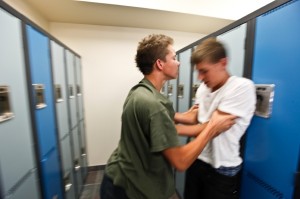 Unfortunately, many children are bound to face occasional teasing and rejection throughout their school years, and we now know that this bullying can affect more than just egos. Previous studies have found kids and teens who are bullied tend to be more depressed, lonely and anxious, and perform worse in school than those who aren’t picked on. So when this bullying is paired with particularly vulnerable students, such as children with autism, life can become even more difficult.
Unfortunately, many children are bound to face occasional teasing and rejection throughout their school years, and we now know that this bullying can affect more than just egos. Previous studies have found kids and teens who are bullied tend to be more depressed, lonely and anxious, and perform worse in school than those who aren’t picked on. So when this bullying is paired with particularly vulnerable students, such as children with autism, life can become even more difficult.
A new survey of parents shows that close to half of teens with an autism spectrum disorder (ASD) are bullied at school. This rate of 46.3 percent, published in the Archives of Pediatrics & Adolescent Medicine, is much higher than the estimated 11 percent of bullied teens in the general population.
It’s also estimated that about one in 88 children in the U.S. has an autism spectrum disorder – and that number is only growing. Autism can affect one’s abilities to recognize social cues and empathize, making interaction with others very challenging. Children with autism also often engage in “unusual” behaviors and tend to be hypersensitive to environmental stimuli, all of which makes them prime targets for bullying at an age where kids only want to fit in and be “normal.”
Now that we have these alarming results, researchers suggest schools should target their anti-bullying campaigns toward the more susceptible population of students with disorders and disabilities.
Dr. Bryan King, director of Seattle Children’s Autism Center, notes, “Every child with autism is different. Schools need to incorporate strategies that address social difficulties and the unique challenges of each child. We are fortunate that some of our local districts are formally studying strategies to improve the social skills deficits common in autism.”
Efforts could be made to support more inclusive environments, create support groups, and train teachers to set the expectation in the classroom that everyone has the right to feel safe and respected, with no exceptions.
Signs Your Child is a Victim of Bullying
- Reluctance to attend school
- Exhibiting emotionally sensitive behavior or anxieties
- Change in daily routines, e.g., diet or sleeping patterns
- Decline in academic performance
- Physical changes including torn clothing, damaged books or cuts and bruises
What You Can Do to Help
- Gather support. Speak to teachers, administrators, and your school board about your child’s needs and the problem of bullying. See if there a support group you and your child can join.
- Talk it out. Talk to your child about friendships and how real friends should behave. Emphasize their strengths, reassure them bullying is not their fault and that unfortunately many children experience bullying. Let them know bullying is always wrong and must be reported.
- Monitor the situation. Visit the school for unrelated purposes to observe how your child is interacting with others. Ask questions and keep the lines of communication open with teachers you trust.
Survey Breakdown
The research involved survey data from 920 parents of children with autism who were asked about their children’s experience of bullying. Of these parents, 46.3 percent reported their adolescents with an ASD had been victimized by bullying. About 15 percent of autistic children were reported to be bullies themselves, roughly the same rate as in the general teen population, and 9 percent were both bullies and victims.
Resources
AbilityPath.org
National Autism Association
Seattle Children’s Autism Center
If you’d like to arrange an interview with Dr. Bryan King or another expert at Seattle Children’s Autism Center, please contact Children’s PR team at 206-987-4500 or at [email protected].

